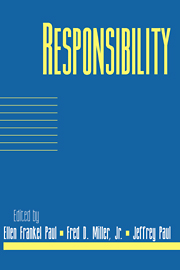Book contents
- Frontmatter
- Contents
- Introduction
- Acknowledgments
- Contributors
- Causation and Responsibility
- Negligence
- Responsibility and Consent: The Libertarian's Problems with Freedom of Contract
- The Irrelevance of Responsibility
- On Responsibility in Science and Law
- Responsibility and the Abuse Excuse
- Why Citizens Should Vote: A Causal Responsibility Approach
- Institutionally Divided Moral Responsibility
- Fate, Fatalism, and Agency in Stoicism
- Ultimate Responsibility and Dumb Luck
- Taking Responsibility for Our Emotions
- Index
Responsibility and Consent: The Libertarian's Problems with Freedom of Contract
Published online by Cambridge University Press: 06 January 2010
- Frontmatter
- Contents
- Introduction
- Acknowledgments
- Contributors
- Causation and Responsibility
- Negligence
- Responsibility and Consent: The Libertarian's Problems with Freedom of Contract
- The Irrelevance of Responsibility
- On Responsibility in Science and Law
- Responsibility and the Abuse Excuse
- Why Citizens Should Vote: A Causal Responsibility Approach
- Institutionally Divided Moral Responsibility
- Fate, Fatalism, and Agency in Stoicism
- Ultimate Responsibility and Dumb Luck
- Taking Responsibility for Our Emotions
- Index
Summary
introduction
Libertarians believe certain things about rights and responsibilities, about when one person is to be held responsible for invading the rights of another. Libertarians also believe certain things about consent, about when someone should be held to a contract he has entered into. What they don't realize is that the first set of beliefs doesn't mix well with the second set of beliefs–that their intuitions about rights and responsibilities quite simply don't square with their intuitions about consent. Or so I shall be trying to show in this essay.
What I have to say is not exclusively a matter of concern to libertarians. Even people who would not consider themselves libertarians usually share a fair number of libertarian beliefs. They are especially likely to share some of the libertarian's core beliefs. That is because the libertarian's core beliefs–as I will be describing them below–are really a pretty deeply entrenched part of our everyday morality. It is hard to conceive how one would do without them. To be sure, nonlibertarians hold many further beliefs–beliefs that would make libertarians recoil. But the fact of overlap means that the problems and tensions I will be uncovering in the libertarian's creed plague many if not most nonlibertarians as well.
Nor is what I have to say exclusively a matter of concern to moral theorists. Lawyers and judges, too, should care about it. Many profoundly puzzling legal questions, it will turn out, arise out of the libertarian tensions I am about to describe.
- Type
- Chapter
- Information
- Responsibility , pp. 94 - 117Publisher: Cambridge University PressPrint publication year: 1999

